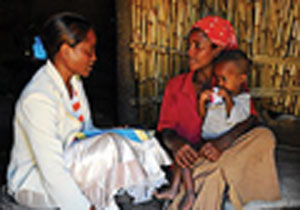4.1 Infant and young child feeding problems in Ethiopia
The first two years of a child’s life are the most important for establishing healthy growth.
Optimal feeding of children during the first two years is critical to break the cycle of malnutrition from generation to generation. The first 24 months is recognised as being the most important window of opportunity for establishing healthy growth. Infant and child feeding practices are major determinants of the risk of malnutrition. A very large proportion of women do not practice optimal breastfeeding and complementary feeding behaviour for their children. About a third of babies do not receive breastfeeding within one hour of birth and only one in three children age four to five months are exclusively breastfed. According to profiles analyses using Demographic Health Survey data, it is estimated in Ethiopia that there are about 50,000 infant deaths a year attributable to poor breastfeeding habits, that is, 18% of all infant deaths every year. You have a critical role to play in helping to address this problem (see Figure 4.1).

Equally important are the serious problems related to when complementary food is introduced, because a large majority of infants are given such foods too early or too late. At six to eight months of age, only one in two children is consuming solid or semisolid food. Much of the inappropriate breastfeeding and complementary feeding behaviour is actually due to lack of knowledge, rather than practical or financial constraints, and you will have plenty of opportunities in your work to give mothers the best information possible.
Learning Outcomes for Study Session 4
